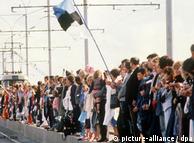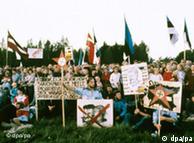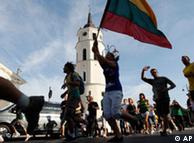History | 22.08.2009
Crisis-hit Baltic states mark 20th anniversary of human chain
Their hands stretching across forests and fields, standing along highways and country roads, as many as 2 million Estonians, Latvians and Lithuanians joined in a 671-kilometer (417-mile) human chain 20 years ago, looking forward to a better future.
But this year's celebration of the Baltic Way, which showed the world the Baltic countries' desire for autonomy apart from the Soviet Union, is looking backward in an attempt to recapture that hope in difficult economic times.
The commemorations include exhibits and academic conferences, but the most hailed event is Heartbeats for the Baltics, a relay run along the Baltic Way route. About 13,500 people will run in one-kilometer stretches, but organizers say anyone can join the relay along the way for any length.
The first runners left the Estonian capital, Tallinn, for the Latvian capital of Riga on Saturday morning. A second group of runners was scheduled to leave the Lithuanian capital of Vilnius later in the day and head north to meet the first group at Riga's Freedom Monument on Sunday.
 Bildunterschrift: Hundreds of thousands joined hands for the Baltic Way in 1989
Bildunterschrift: Hundreds of thousands joined hands for the Baltic Way in 1989
The end of Communism
The Baltic Way human chain on Aug. 23, 1989 coincided with the 50th anniversary of the Molotov-Ribbentrop pact, which had divided the Baltic states into spheres of influence and led to the eventual annexation by the Soviet Union in 1940.
The participation of 2 million people, in a region whose population is around 7 million, would have been a significant accomplishment even if it hadn't occurred under the shadow of Soviet control.
"People are always looking to break records, but what we did, it was not a record attempt," said Nomeda Marcenaite, who was there in 1989. "It was a spiritual thing, perhaps a spiritual record."
Putting on the running shoes
 Bildunterschrift: Großansicht des Bildes mit der Bildunterschrift: Demonstrators along the 1989 Baltic Way
Bildunterschrift: Großansicht des Bildes mit der Bildunterschrift: Demonstrators along the 1989 Baltic Way
Latvian President Valdis Zatlers will be joining in on the last leg of the commemorative run on Sunday. The relay was his pet project, and he said that he hoped it would inspire the generation of people too young to remember the original event.
"We gave a clear signal: we are organized, we have overcome the Molotov-Ribbentrop pact and we are ready to go forward and be dynamic in a challenging world," Zatlers said. "That's the way Balts do things."
Sixten Sild, who helped organize this year's event as chairman of the Estonian Orienteering Association Board, will be running three kilometers early Sunday morning near the Latvian-Estonian border.
"I want to run there because 20 years ago that was where I stood in the Baltic chain with my parents," Sild said. His two adult sons will be participating as well.
Fresh courage needed
Estonia and the other Baltic states have been hit hard by the global financial crisis. The European Union's statistical office Eurostat counted the three countries' economic performance as the worst in the euro zone. Lithuania's economy has contracted 12.3 percent over the same quarter last year, Estonia lost 3.7 percent, and Latvia 1.6 percent.
Estonia has had to raise sales taxes and make serious budget cuts, tough decisions which ultimately led to the collapse of its coalition government in May. In Latvia, unemployment has also soared to 16.7 percent. The World Bank estimates that the number of Lithuanian families living in poverty could increase by 49 percent this year.
"It is once again very important to stand together and to show that we can reduce the negative consequences of the recession, undertake greater responsibilities, and be more courageous in dealing with the challenges of our age," said Lithuanian President Dalia Grybauskaite.
svs/reuters/dpa/afp
Editor: Toma Tasovac

沒有留言:
張貼留言